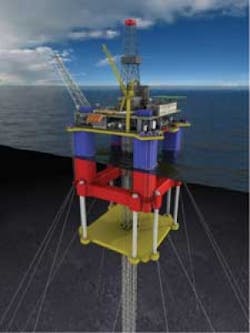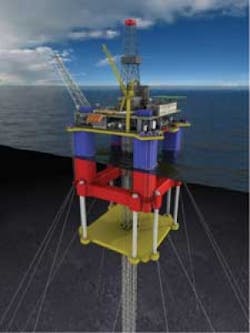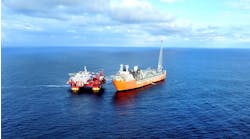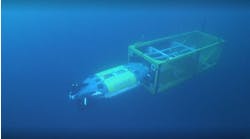Gene Kliewer • Houston
Petrobras calls for more subsea boosting systems from Aker
Petrobras has contracted Aker Solutions to supply eight more subsea boosting systems (Mobo) and one ESDV (emergency valve) for the Jubarte field, in north Campos basin offshore Brazil. Contract value is approximately $37 million.
This contract follows a similar job awarded to Aker Solutions in May 2007. Compared to the earlier project, improvements to optimize oil production have been made such as changes in flowlines to reduce pressure loss. Additionally, pressure in the pump has increased from 3,600 to 5,000 psi (24.8 to 34.5 MPa). There will also be changes on valves, pipes and structures, besides the inclusion of nine new tools to support the installation, according to Aker.
The equipment will be manufactured in Curitiba, Aker Solutions’ headquarters in Brazil.
Around the world in the Bay of Bengal, India, Aker Solutions has a $25-million contract with Reliance Industries Ltd. to support developments in MA-D6 and KG-D6. The contract covers inspection, testing, and maintenance of subsea hardware for three years.
Aker Solutions has previously delivered subsea production systems to Reliance’s fasttrack projects in the KG-D6 block. This latest contract extends the scope to cover lifecycle services.
Petrobras’ P-55 EPIC goes to Subsea 7
Petrobras has awarded Subsea 7 Inc. a $200-million contract to engineer, procure, fabricate, install, and commission one 12-in. (30.5-cm) by 38.7-km (24-mi) gas export line and one 12-in. by 42-km (26-mi) oil export line connecting theP-55 platform to the PRA-1 platform. The scope of work also includes the procurement and installation of associated subsea equipment.
The offshore pipelines and equipment installation campaign will take place between 3Q 2010 and 2Q 2011 and will be carried out by one of Subsea 7´s pipelay installation vessels.
Engineering and project management work will be conducted at Subsea 7´s offices in Niteroi, Rio de Janeiro, and the fabrication of the rigid pipelines will be carried out at Subsea 7´s pipeline fabrication spoolbase at Ubu, Brazil.
Roncador field is in Campos basin in Rio de Janeiro state coast in water depths range from 200 m (656 ft) to 1,800 m (5,905 ft).
J. Ray extends Mideast contracts for operations support
J. Ray McDermott has extended for 3½ years an existing contract with Fugro Survey (Middle East) Ltd. for survey, positioning, and ROV services in the UAE, Qatar, Saudi Arabia, and India.
This contract includes the provision of geophysical survey, Differential Global Positioning and Ultra Short Baseline positioning, metrology, and a full range of ROV services, says Fugro.
J. Ray operates four work barges in the region along with the requisite support vessels.
Technip, Schlumberger to cooperate on flex pipe integrity
Technip and Schlumberger have signed a global joint development agreement to work on subsea integrity and surveillance for flexible pipes used in deepwater oil and gas production. The pact extends an agreement dating to 1998.
The agreement initially focuses on surveillance systems for new and challenging flexible pipe applications such as those required in the deepwater pre-salt environment in Brazil.
One of the initial integrity solutions that the partners expect to develop and qualify is the use of optical fibers to monitor a variety of parameters characterizing pipe behavior.
LRUT on risers in Nigeria requires no shutdown
Chevron Nigeria has turned to long-range ultrasonic testing (LRUT) to address specific corrosion problems with risers. Chevron wanted to inspect the risers without closing the whole field and losing that revenue.
SGS Industrial Services supplied LRUT that does not require removing clamps and can be applied for pipes in operation. Chevron was able to check the condition of the risers and then schedule repairs shutdowns to save costs.
LRUT, also known as guided wave technology, is a newly accepted non-destructive test to evaluate insulated pipes, cased sections, road crossings, compressor station piping, buried pipelines, tank dike piping, and most piping systems which are difficult to access and could not otherwise be inspected economically.
The guided wave technology screens 100% of the volume of the piping inspected, says SGS. A typical application of LRUT is to detect corrosion and metal loss in pipes and pipelines. LRUT uses guided ultrasonic waves which can travel many meters with minimal attenuation and therefore offer the potential of testing large areas from a single point using a pulse-echo transducer bracelet wrapped around the pipe.
This technology is suitable for inspecting pipes in operation, insulated, and even buried as it supplies data with minimum insulation removal.
Riser tension monitoring set offshore Angola
Heerema Marine Contractors has selected Schlumberger to supply real-time riser tension monitoring for nine single-leg hybrid risers (SLHRs) offshore Angola.
The nine SLHR are around an FPSO turret mooring and connect to it by flexible jumpers. The SLHR are free standing and are maintained in tension by a buoyancy tank. As part of the project, Schlumberger will install its subC-collar tension and curvature monitoring system on each riser immediately below the buoyancy tank.
The subC-collar units are powered by local ROV replaceable batteries, which also include an acoustic telemetry module to transmit the riser tension data to two receiving units located on the FPSO. This capability helps to avoid shadowing effects from the risers and flexible jumpers.




